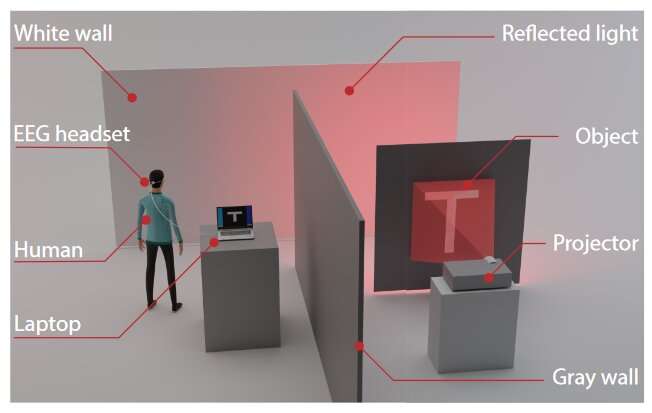Study shows human brain can assist with computational ghost imaging

Interacting with computers by brain activity seems less futuristic these days, thanks to researchers and entrepreneurs who have been attempting to tap the potential of brain-computer interfaces for augmented cognitive abilities.
Recently, Gao Wang and Daniele Faccio at the University of Glasgow demonstrated that it is possible to connect a human brain and a computer to perform simple computational imaging tasks. Similar advances could someday extend the sensing range of human vision and provide new approaches to the neurophysics of human perception. This research was published in Intelligent Computing.
Wang and Faccio used ghost imaging to computationally reconstruct images of an object hidden behind a wall. Ghost imaging relies on the use of varying illumination patterns and the detection of corresponding light intensity values.
Traditionally, the light intensity values are detected by a camera or other similar device, but some researchers have also tried using the human visual system as a sensor. What makes Wang and Faccio’s work unique is that they used the human visual system for two purposes: it not only detected visual signals but also gave real-time feedback.
In Wang and Faccio’s experiment, flickering light patterns were projected onto an object and reflected from a secondary white surface. The intensity values of the reflected light were detected by the participant’s visual cortex and captured as electrical signals by a headset with a single electrode. The signals were then processed on a laptop by an algorithm designed to reconstruct an image of the hidden object. “A first impression might be that the visual system is simply acting as a different kind of camera,” the authors explained.
For more efficient and higher-resolution imaging, the authors added an adaptive computational loop. With the help of real-time feedback given by the human visual system, they could modify the projected light patterns and “carve” out the less-helpful ones to improve both imaging speed and image quality.
However, the authors found out in a follow-up experiment that when participants were asked to say or type on a keyboard the perceived light intensity while their brain signals were being monitored, the quality of the reconstructed images was reduced.
Wang and Faccio believe their paper lays the foundations for brain-computer systems to enable alternative computation forms within and beyond imaging. They also pointed out that there is more to be investigated, given the tension between conscious and non-conscious processing.
Wang and Faccio designed the experiments and wrote the manuscript. Wang performed the experiments, collected and analyzed the data.
More information:
Gao Wang et al, Computational Ghost Imaging with the Human Brain, Intelligent Computing (2023). DOI: 10.34133/icomputing.0014
Provided by
Intelligent Computing
Citation:
Study shows human brain can assist with computational ghost imaging (2023, March 29)
retrieved 29 March 2023
from https://techxplore.com/news/2023-03-human-brain-ghost-imaging.html
This document is subject to copyright. Apart from any fair dealing for the purpose of private study or research, no
part may be reproduced without the written permission. The content is provided for information purposes only.
For all the latest Technology News Click Here
For the latest news and updates, follow us on Google News.

